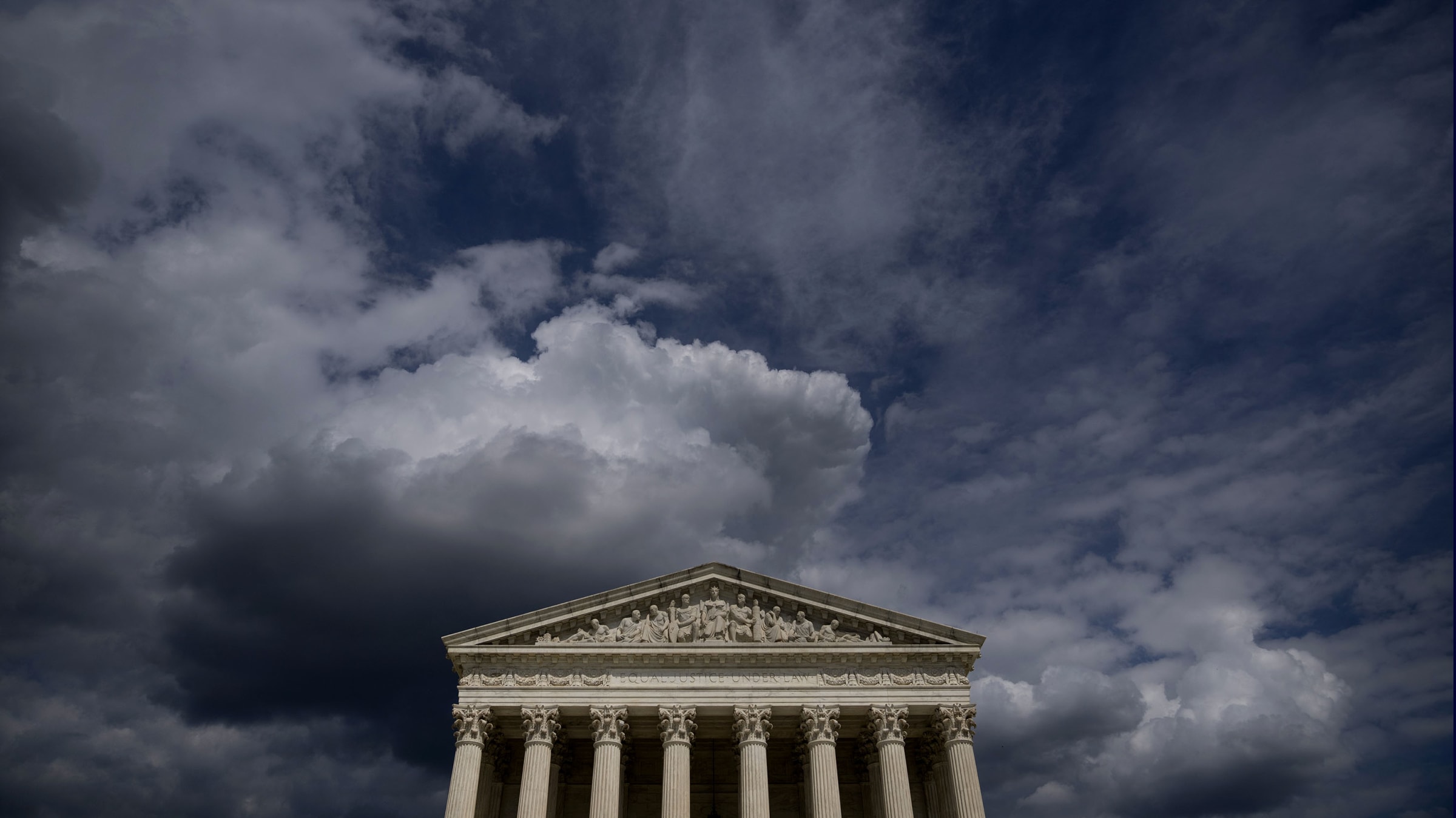If Conservatives Take Down Roe v. Wade, They Could Go Down With It

Drew Angerer/Getty
If the Supreme Court rolls back abortion rights next year as expected, the political fallout could be devastating.
Forget everything you know about American politics, including all the conventional wisdom about the 2022 midterms. Forget all the variables like candidate recruitment, the economic recovery, inflation, crime, or even Joe Biden’s accomplishments between now and then. And forget all the historical precedent regarding how the president’s party always loses seats in the midterms. There’s a good chance it will all be blown away in the form of a huge thunderbolt that hits next summer.
It’s been a month since we learned that the Supreme Court will take up a case that could result in weakening—or even reversing—Roe v. Wade, the 1973 precedent that legalized abortion; it’s clear that the general public has not fully comprehended (a) the likelihood this will happen, (b) the timeframe, or (c) the political ramifications. I know this is true because I was shocked recently to discover that some of my smarter and better-connected conservative friends are increasingly hopeful Roe will be reversed. This simultaneously pleased and, I must confess, frightened me.
That’s because the media outrage and potential political backlash could be explosive, and this could turn out to be not exactly a pyrrhic victory for opponents of abortion but certainly one that inflicts more damage than they currently seem to be anticipating.
Let’s start with the likelihood of Roe crumbling or collapsing, which I believe to be much greater than generally appreciated. The test case will be a Mississippi law that bans abortion after 15 weeks that was blocked by an appeals court that found it was at odds with Roe. Why does the high court’s decision to take this case portend that something big could be coming? It takes four justices to agree to take on such a case, and it seems unlikely that conservatives on the bench (who now hold a clear majority) would take it up if their decision would undermine the conservative cause.
Regardless of your feelings about abortion (I view it as the taking of a life, but my purpose here is to discuss the political fallout—not the moral implications), Roe was always on shaky ground. That’s because in Roe, Justice Harry Blackmun held that there was a right to privacy implicitly derived from the due process clause of the 14th Amendment. Anyone alive in 1868 would have been stunned to learn the 14th Amendment implicitly legalized abortion, which became criminalized (except in instances where the life of the mother was at stake) around 1880. For over a hundred years, the amendment did nothing to legalize abortion.
And it’s not just conservatives who believe the Roe decision was a bad one. Ruth Bader Ginsburg famously agreed that the precedent was reasoned badly.
It’s also possible that the court could decide the case on narrower grounds that don’t require actually ending Roe. But if the goal were to nibble around the edges, conservatives on the high court might have sought out a case that could have been decided on smaller grounds. The court could have made clear that it was rethinking Planned Parenthood v. Casey, teeing up more cases (important note: It’s common to refer to Roe as shorthand, but the key case is 1992’s Planned Parenthood v. Casey, in which the Supreme Court purported to affirm the “core” right of Roe, but replaced Roe’s three-trimester framework with a nebulous “undue burden” test.)
Short of completely overturning Roe, I think the most likely decision would allow states to ban abortions after 15 weeks. (This may surprise readers, but this law would still be more liberal than cosmopolitan France!)
Regardless, this would still create a firestorm of backlash.
To fully appreciate this, it’s important to understand how important this hot-button issue has been for nearly 50 years, with public opinion remaining divided even as it’s shifted dramatically on things like gay rights and interracial marriage.
It’s entirely possible that Donald Trump would not have been elected in 2016 had he not decided to publish a list of conservative judges he would nominate if elected and had Mitch McConnell not decided to keep Justice Antonin Scalia’s seat open. Those two decisions pushed conservative voters, who otherwise did not like Trump, to pull the lever for him.
But Roe’s impact goes much deeper than recent history. It’s impossible to overstate how it has affected the last (nearly) five decades of American politics. Roe basically short-circuited arguments being hashed out by legislatures that might have led to some consensus or provided some sense of closure. In most cases, when the court rules against public opinion, the public eventually comes around and agrees with the court. That hasn’t happened with Roe, as is evidenced by the ugly fights over confirming judges like Robert Bork, Clarence Thomas, and Brett Kavanaugh. Many other nominees were less famously raked over the coals because of Roe. And let’s be honest, those fights were really just surrogate skirmishes when compared with the one that could be coming next summer.
Speaking of Thomas and Kavanaugh, think of the optics; many progressives associate these men with the sexual misconduct allegations levied against them. In the eyes of some, that will only make this decision, should it come, more egregious. You just know that Donald Trump would poison the well further by claiming credit for any such ruling, by virtue of his three SCOTUS picks. What is more, Mitch McConnell’s decision not to even allow a hearing for Merrick Garland is still recent enough to sting.
The long-term implications of all of this could involve white college-educated suburbanites fleeing the GOP in even larger numbers than we have seen, as well as ironically removing what is one of the few remaining reasons NeverTrump conservatives might have had for staying in the party. (To be sure, those who believe that this is a life-or-death moral issue should be willing to suffer political consequences, but suffer, they may.)
It’s also important to note that overturning Roe would not ban abortion, but rather, send the decision back to the states. Interestingly, though, this, too, could pose a political problem for Republicans. Gaming out what might happen there, it’s possible that conservative voters (who wrongly assumed all this would actually ban all abortion) will be disenchanted and feel misled by a corrupt system and its establishment elites. It’s also possible that “woke” capitalist corporations might then decide to boycott states that impose abortion restrictions, which could lead to a backlash against the backlash. And just imagine the fights that will be happening in numerous state capitols.
Lastly, this could upset everything we think we know about the 2022 midterms. Right now, history suggests that Republicans will reclaim the House and Senate, but all bets are off if this political atomic bomb hits… and if it does hit, it will likely be just months before the voting. What if Joe Biden actually gains seats in the midterms?
Now, I’m not suggesting that the short-term political fallout means that people who oppose abortion on principle should abandon the fight. It’s just that they should gird their loins. People have no idea how likely this variable is to occur. If you think 2020 and 2021 were interesting, you ain’t seen nothing yet.
